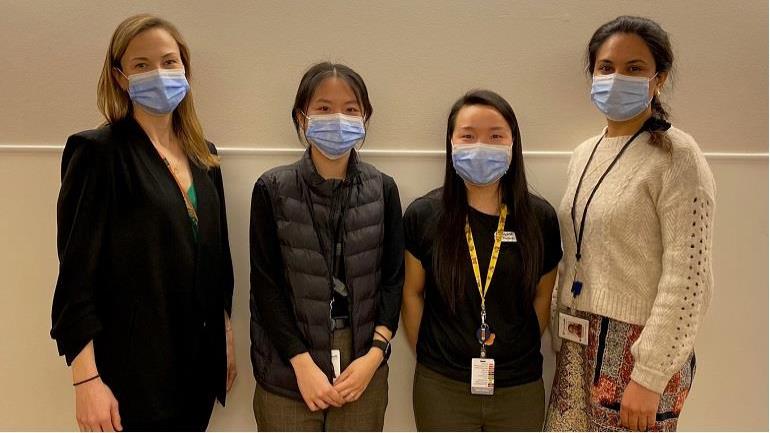
The Pharmacy Services team at Surrey Memorial Hospital is improving patient experience through an innovative, team-based approach to care.
(Photo) (L-R): Rochelle Gellatly, clinical coordinator, Ginny Chen, access and flow pharmacist, Dyana Louie, access and flow pharmacist and Rajwant Minhas, access and flow supervisor
The heart of access and flow is ensuring patients are able to obtain the right care, in a timely manner, in the right place. In order to do so, they must also be able to move safely through the health care system to get where they need to go.
“In order for [access and flow] to work, it requires all hands on deck,” says Dr. Rochelle Gellatly, clinical coordinator, Pharmacy Services at Surrey Memorial Hospital. “Pharmacy services are no exception.”
Clinical pharmacists are an important part of an acute site’s multidisciplinary team. They provide direct care to patients and work on wards to identify and resolve medication-related problems. To receive their clinical designation, pharmacists complete an additional one-year hospital pharmacy residency after their entry-to-practice degree.
The demand for clinical pharmacy services are high – a demand exacerbated by population growth.
Knowing this, Rochelle spoke to her site’s leadership about how they could bring in entry-to-practice pharmacists to work alongside clinical pharmacists. This partnership would allow her team to work with more patients and help them efficiently move through the health system.
Now known as the access and flow pharmacists, these newly recruited entry-to-practice pharmacists began in November 2022 in Surrey Memorial Hospital’s in-patient wards.
“The access and flow pharmacists perform medication histories and provide patient education and medication management at discharge,” Rochelle explains. “This helps identify and resolve more medication-related problems upon a patient’s admission or during their hospital stay. It also ensures more patients understand their medications or any changes to their medication at the point of discharge.”
The clinical pharmacists at Surrey Memorial Hospital have been supportive of the new approach.
“The team-based model has been instrumental in managing workload,” says Sandy Baptie, clinical pharmacist.
Fellow clinical pharmacist Florian Zhou agrees: “Access and flow pharmacists help broaden our reach and we feel more confident that patients are going home empowered with knowledge around their medicines. By assisting more patients in a comprehensive way, we can help reduce their length of stay and related hospital readmissions.”
Dr. Rajwant Minhas is a clinical pharmacy specialist and the clinical supervisor for the access and flow pilot project. She has found working with the access and flow pharmacists incredibly helpful.
“The information collected by them has assisted in better decision making with patients and the health care team,” says Rajwant. “I have also been able to spend more time with patients and caregivers one-on-one.”
While the pharmacy team has just begun evaluating the impact of the pilot so far, initial feedback from patients and families have been positive.
“Many patients and families are appreciative of the care paid to their medication questions and want to learn more,” says Ginny Chen, access and flow pharmacist. “Working together helps us get patients home safely and in a timely manner, which ensures more beds are available on the unit for patients who are coming from other sites or the emergency department.”
While Rochelle and her team acknowledge that this is one of the many initiatives that are in place to improve access and flow, she says, “My hope is that Pharmacy Services can work hand-in-hand with the other acute disciplines to make a greater impact. I also hope that this initiative shows the importance of trying creative solutions and the importance of quality improvement − this is how we move health care forward.”
March is Pharmacy Month.
